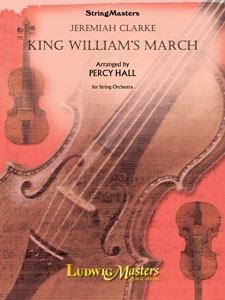King William's March
Buy this item (in stock)
Product ID: LW2 50250027
By Jeremiah Clarke
Publisher:
LudwigMasters
Arranger:
Hall
Series:
Concert Strings
Genre:
Baroque
Line Up:
String Orchestra
Duration:
2:00
Level: 2
Set & Score
This item is in stock
About this item
If you liked Trumpet Voluntary, you're going to love Percy Hall's setting of King William's March. Composed for an unknown occasion for William of Orange, the King of England, the march shows Clarke at his melodic best. All the pomp and pageantry of the Renaissance comes to life in this sure-to-be-a-classic arrangement.
Instrumentation
1 Full Score
8 Violin 1
8 Violin 2
2 Violin 3 (subst. Viola)
5 Viola
5 Cello
5 Bass
1 Piano opt.
Reviews and rating
No review available, be the first to write one!

Composer
Jeremiah Clarke (1674-1707)

Jeremiah Clarke (c. 1674 – 1 December 1707) was an English baroque composer and organist.
Thought to have been born in London around 1674, Clarke was a pupil of John Blow at St Paul's Cathedral. He later became organist at the Chapel Royal. "A violent and hopeless passion for a very beautiful lady of a rank superior to his own" caused him to commit suicide. Before shooting himself, he considered hanging and drowning as options, so to decide his fate, he tossed a coin—however the coin landed in the mud on its side. Instead of consoling himself, he chose the third method of death, and performed the deed in the cathedral churchyard." Suicides were not generally granted burial in consecrated ground, but an exception was made for Clarke, who was buried in the crypt of St Paul's Cathedral (though other sources state he was buried in the unconsecrated section of the cathedral churchyard). He was succeeded in his post by William Croft.
Clarke is best remembered for a popular keyboard piece: the Prince of Denmark's March, which is commonly called the Trumpet Voluntary, written circa. 1700. From c. 1878 until the 1940s the work was attributed to Henry Purcell, and was published as Trumpet Voluntary by Henry Purcell in William Sparkes's Short Pieces for the Organ, Book VII, No. 1 (London, Ashdown and Parry). This version came to the attention of Sir Henry J. Wood, who made two orchestral transcriptions of it, both of which were recorded.The recordings further cemented the erroneous notion that the original piece was by Purcell. Clarke's piece is a popular choice for wedding music, and has featured in royal weddings.
The famous Trumpet Tune in D (also incorrectly attributed to Purcell), was taken from the semi-opera The Island Princess which was a joint musical production of Clarke and Daniel Purcell (Henry Purcell's younger brother)—probably leading to the confusion.
More info about the composer...



 Click above to view samples
Click above to view samples
